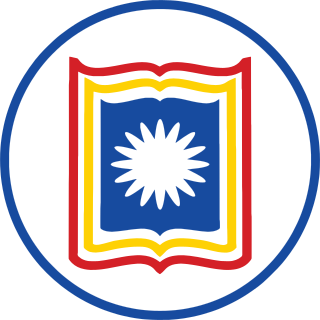
The University of Rajshahi, also known as Rajshahi University or RU, is a public co-educational research university in Bangladesh situated near the northern Bangladeshi city of Rajshahi in a 305-hectare (753-acre) campus at Motihar, 3 kilometres (2 mi) East of the Rajshahi city center. It is the second largest, in terms of academic activities and campus area and also the second oldest, university in Bangladesh. The university's 60 departments are organized into ten faculties. It is considered one of the top research universities in Bangladesh. Researchers of this university have recently contributed a significant amount of effort and played a key role in bringing back medieval Bangladeshi Muslin fiber. It has a formidable alumnus base around Bangladesh and abroad. Because of its beautiful and well-planned verdurous campus, academic atmosphere and traditional inclination towards outdoor sports, it is popularly known as the Cambridge of the East.

Dhaka College is the oldest secular educational institution of Bangladesh located in Dhaka. It offers higher secondary education (HSC). It has Honours and Masters programs as well which are affiliated to the University of Dhaka.

The University of Dhaka was established in 1921 as the first university in East Bengal. Following demands from Nawab Sir Khwaja Salimullah Bahadur and others, Viceroy Lord Hardinge proposed on 2 February 1912, that a new university should be established in this partition of Bengal.
Muhammad Enamul Haque was a Bangladeshi researcher, litterateur and educationist.
Azizur Rahman Mallick was a Bangladeshi historian and educationist.
Abū al-Khayr Muḥammad Ayyūb ʿAlī al-Māturīdī, or simply Ayub Ali, was a Bangladeshi Islamic scholar, author and educationist. He was awarded the Ekushey Padak in 1976 by the Government of Bangladesh.

Rafiqul Islam was a Bangladeshi educationist, scholar, writer, linguist and cultural activist. He was the president of Bangla Academy since May 2021 until his death. He was inducted as a National Professor by the Government of Bangladesh in July 2018. He was a vice-chancellor (2007–2011), professor emeritus and adviser to the Centre for Bangla Studies of the University of Liberal Arts Bangladesh (ULAB). He served as the chairman of the Nazrul Institute Trustee Board. He was awarded Ekushey Padak in 2001 and Independence Day Award in 2012 by the Government of Bangladesh.
M. A. Rashid was a Bangladeshi educator. He served as the 1st Vice-chancellor of Bangladesh University of Engineering and Technology during 1962–1970. He was awarded Independence Day Award in 1982 by the Government of Bangladesh.

Sir Ahmad Fazlur Rahman, also known as A. F. Rahman, was a Bengali academic. He served as the first Bengali Vice-chancellor of the University of Dhaka during 1934–1936. He was knighted by the British Government of India in 1942.
Mahmood Hasan was an academic who served as the 5th vice-chancellor of the University of Dhaka.

Muhammad Ibrahim was a Bengali judge and academic. He served as the 8th Vice-chancellor of the University of Dhaka during 1956–1958.

M Osman Ghani was a Bangladeshi scientist, educationist, and academic. He served as the 11th vice-chancellor of the University of Dhaka.

George Harry Langley was an English academic who worked primarily in Dhaka, which was then in British India. He served as the second vice-chancellor of the University of Dhaka from 1926 to 1934.
Syed Moazzem Hossain (1901–1991) was a Bangladeshi academic and Islamic scholar. He served as the vice-chancellor of the University of Dhaka.
Muzaffar Ahmed Chowdhury was a Bangladeshi academic. He served as the 13th vice-chancellor of the University of Dhaka. He was appointed the Minister of Education of the Government of Bangladesh for two terms.
Abdul Matin Chowdhury was a Bangladeshi academic and physicist. He served as the 14th Vice-chancellor of the University of Dhaka.
Syed Sajjad Hussain was a Pakistani-Bangladeshi academic and writer. He served as the 4th Vice-chancellor of the University of Rajshahi.
Muhammad Abdul Bari was a Bangladeshi academic, linguist and Islamic scholar.
Abul Faraḥ Muḥammad ʿAbdul Ḥaque Farīdī was a Bangladeshi educator and author. In recognition of his contributions in the field of linguistics, he was awarded a Bangla Academy Fellowship. Faridi was the founder of Islamic Foundation Bangladesh's Islami Bishwakosh project and also worked closely with Bangladesh Scouts.

Abū Naṣr Muḥammad Waḥīd, or simply Abu Nasr Waheed, was a Bengali Islamic scholar, educationist, author and politician. He is best known for his reformations to Islamic education in Bengal, and development of Arabic language education among Bengali Muslims. Wahid also served as the Education Minister of British Assam and a member of the Assam Legislative Assembly.










